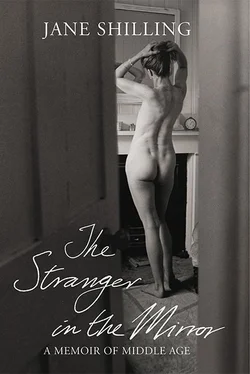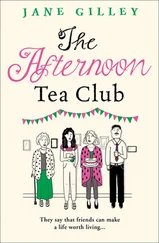I thought I would find it difficult to sustain an erotic life with a person who treated me as his housekeeper, weltering in self-pity and leaving his socks and coffee cups all over the house for me to tidy up when I got home from work. Like Mme du Deffand, whose most contented thought in old age was that she wasn’t married to a certain M. de Jonzac, I warmed myself with the thought that at least I didn’t have to share my bed with a petulant 50-year-old toddler.
Still, I knew there was a mystery there, inside these apparently unenviable marriages, that I should probably never get to the bottom of, and I couldn’t help gnawing away at it – sometimes relieved, sometimes with the sensation of having missed something rich and full of vitality; always fascinated.
‘The two things I aimed for I failed at,’ wrote Martha Gellhorn to her friend Betsy Drake. ‘I wanted a great single man-woman love and to write a great book.’ I wasn’t that ambitious. Just the great love would have done for me.
Three or four times in my life, between my early teens and mid-forties, I thought I had found the magic formula that would admit me to the place where my search for a lasting love would come to an end. But each time the proportions had proved wrong; the product of the alchemy had been at worst a devastating explosion, the air filled with sharp shards of anger, reproach and contempt; at best a corrosive vapour of disillusion or regret. In either case, the door to the place where love was calm and reciprocated remained obstinately shut.
In adolescence, at the beginning of an erotic career, the ideal arc of love and desire seemed marvellously simple, even if the realisation of it remained obscure. At 15, I knew without doubt that I would fall in love: there might be difficulties and dangers along the way but eventually my love would be returned and then I would live happily ever after. The tenacity of this belief was remarkable. Long after all sorts of other ambitions – for academic distinction or worldly success – fell away, the primitive belief in the existence of my true love – out there, somewhere, searching for me – persisted.
Such fantasies feed on the conviction of singularity. It is only when you turn to the lonely hearts columns and see, laid out like a shoal of herrings on the fishmonger’s slab, the terrible pathos of the thousands of accumulated 35-to-seventysomethings, all hoping beneath their wistful taglines of ‘Better luck this time????’ or ‘Could you be the one for me?’ for ‘a gentleman to sweep me off my feet’; convinced that ‘life is what you make it’; brightly touting themselves as ‘fun to be with’, gallantly admitting that they ‘need to get out more’, or are ‘a bit of a weeble really’, that doubt begins to grow and the idea of a dignified retreat from the fine old conflict begins to look altogether more desirable than fighting on.
The experience of love was so distant by this time, its disturbances dwindled to a vestigial twinge, like the ghostly intimations of a long-abandoned adolescent talent for tap-dancing or playing the trumpet, that it was hardly necessary for me to make a gesture of renunciation. Love had renounced me.
On the outside, I was still playing the game: still painting and dressing myself each morning in the elaborate armour of attraction. But my bruising clutch of maladroit attachments had made me – too late – wary and farouche, while years of bringing up a child alone had developed my wilful and bossy tendencies to the exclusion of more pliable traits. Fate had neatly fixed it so that the only men who might possibly find me attractive were the kind that wanted a competent maternal figure to take care of them – the very ones, in fact, whom I absolutely couldn’t be doing with.
During the summer holidays my son began taking tennis lessons at the court in the nearby park. It was a pleasant walk on a summer’s day from our house to the courts: up the hill beneath the avenue of old limes and sweet chestnut trees; past the boating lake and the playground of shrilling toddlers, over the parched grass strewn with the clinging bodies of lovers, around whose static bliss jostling gangs of schoolchildren adroitly swerved. Through the rose garden with its formal beds of orange and knicker-pink hybrid teas, and out at the gate by the putting green where the tennis coach’s wooden pavilion looked like a bathing hut at low tide.
The inhabitant of the hut was Luke, a sweet-faced young man with a sparse crop of blond stubble, who dressed like a toddler in baggy three-quarter-length shorts and little white ankle socks. He was a very good teacher: patient, but unforgiving of idleness or fits of temperament. From our desultory weekly conversations as I handed over the cash for the lessons it emerged that the tennis was only a summer job. The rest of the time he was a linguist – a trainee translator with a couple of degrees. He lived with his parents and was quite a lot older than I had guessed – late twenties rather than early.
One sunny afternoon as I lay in the shade of a mulberry tree by the tennis court, half reading a novel, half listening to the pock of racquet on ball and the murmur of Luke’s admonitions to Alexander, a shadow fell over the page and I looked up from my book to see the brilliantly polished shoes and elegant pale-grey summer-weight trouser legs of my old friend of the weekly lunches. I was delighted to see him, as one is on meeting a friend in an unexpected setting. Normally I saw him only by appointment, grasping his knife and fork on the other side of an expanse of starched tablecloth. There was something sweetly flighty about this encounter under the mulberry tree – something wayward and suggestive about the setting of artificial pastoral, like the chance meetings in woodland of Shakespeare’s comedies or Mozart’s operas, from which so much bittersweet confusion results. We chatted for a moment, until the lesson was over. Then he left, kissing me as we parted, and I turned back towards the tennis court, where Alexander was picking up balls while Luke stowed the racquets in his hut.
‘Was that Alexander’s father?’ he asked as I gave him the money for the lesson. The idea was so bizarre that I laughed. ‘Only it looked,’ he said, rather severely, ‘like a secret assignation there, under the tree.’
‘But not very secret, in the middle of Greenwich Park. And not an assignation,’ I said, still laughing as I uncapped my bottle of water and took a swig. ‘Would you mind if I had some of your water?’ he asked. I passed him the bottle and he put his mouth to the lip of it, just where my mouth had been a moment before.
It was a gesture at once trivial and fraught with a sort of erotic pique. He was very good-looking, very charming and very sweet – the darling of the tennis mothers. And he evidently hadn’t cared for the vignette he’d glimpsed under the tree, of one of his adoring flock being distracted by some old bloke in a city suit. The little pantomime with the water bottle had a quaint air of reproof about it – the young stag chasing off the old chancer.
Ha! I thought, flouncing homeward down the hill, I am an object of desire, this sunny summer’s afternoon, to two separate men. Pity one of them’s old enough to be my father, and the other one young enough to be my son. But still…
And then I was suddenly nailed in the vitals by an appalling stab of desire and an equally terrible stab of shame. Not so much shame at the idea of wanting to be seized and crushed into the corner of the tennis hut by a youth half my age in little white socks (or seized and crushed into the bark of the mulberry tree by a distinguished old party in a pearl-grey business suit, come to that) as by the sheer silliness of that redundant stirring of desire, of which nothing was ever going to come.
Читать дальше












